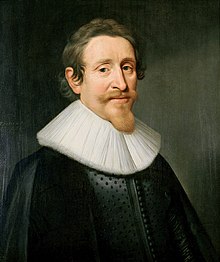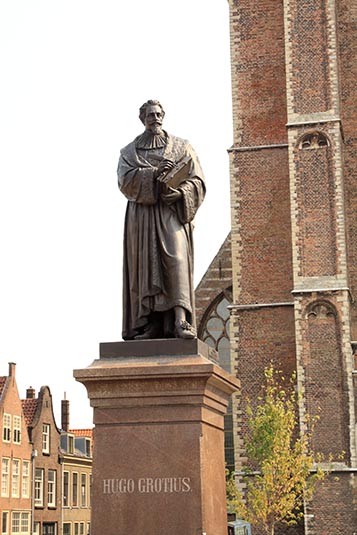
1625 - first publication of On the Law of War and Peace: Three books (De jure belli ac pacis libri tres), dedicated to Louis XIII.
Begun in prison, the work was intended to address the long running conflicts between Spain and the Netherlands (Eighty Years' War/Dutch War of Independence,1568–1648) and between Catholic and Protestant European nations (Thirty Years' War,1618-1648). Both of these conflicts ended in 1648 with the Peace of Westphalia.
[T]here is a common law among nations, which is valid alike for war and in war, I have had many and weighty reasons for undertaking to write upon the subject. Throughout the Christian world I observed a lack of restraint in relation to war, such as even barbarous races should be ashamed of; I observed that men rush to arms for slight causes, or no cause at all, and that when arms have once been taken up there is no longer any respect for law, divine or human; it is as if, in accordance with a general decree, frenzy had openly been let loose for the committing of all crimes. The Law of War and Peace, trans. Francis Kelsey (Carnegie edition, 1925), Prol. sect. 28.
In the three books he argued:
Grotius' concept of natural law had a strong impact on the philosophical and theological debates and political developments of the 17th and 18th centuries. Among those he influenced were Samuel Pufendorf and John Locke, and by way of these philosophers his thinking became part of the cultural background of the Glorious Revolution in England and the American Revolution. He in turn had been influenced by Francisco de Vitoria and Francisco Suárez, both theologians who addressed the question of jus gentium or law of nations, and Alberico Gentili, a lawyer and jurist.3
While Grotius may not have originated the ideas regarding the law of nations, his talent may have been in his ability to synthesize and focus on the issues at hand. De Jure Belli ac Pacis was not considered the most original treatise on the law of nations but it was considered the most systematic. It dealt with the whole range of relations among independent political communities, with peace as well as with war, and with what today we would call private international law.
"It is no detraction from the merit of Grotius to say, that a work so admirable for his own times has been found incomplete in ours. Still there is much in it applicable to all times, and it must ever be a standard authority." International Law, Grotius on War and Peace, p. 7, 1854
1630 - Remonstrants given freedom to build and run churches and schools and to live anywhere in Holland. Prince Maurice had died in 1625 so many Remonstrants returned from exile. They established a theological seminary at Amsterdam where Grotius came to teach.
1635 - became Sweden's ambassador to France. Sweden's King Gustavus Adolphus had been an admirer of Grotius.4 His heir's regent, Axel Oxenstierna, was also a fan and saw that Grotius was appointed to the post.5 
His appointment to represent Sweden appears to have come about because Sweden and the Netherlands were Protestant states and both belligerents in the war against Habsburg Spain and the Habsburg Emperor in Germany. Aside from his involvement in the negotiation of a treaty which brought France into the Thirty Years' War on the side of Sweden, he appears to have paid more attention to his studies rather than his diplomatic duties.
1642 - publishes De Origine gentium Americanarum. In this investigation of the origin of the natives of America, Grotius concludes that the original inhabitants of North America were Norwegians, the Peruvians are descendants of the Chinese, and South Americans were originally from the East Indies.
Died August 29, 1645
He had resigned his diplomatic post but expected to remain in the service of Sweden. He made a visit to Sweden and although given honors and gifts, he was not offered another public position. Grotius had to accept his days of public service were ended and he must return to private life.
His ship left Stockholm bound for Lubeck but was caught in a storm for three days. The ship was eventually destroyed. Grotius is battered and washed shore but alive. He is taken to the city of Rostock and survives for three days. At the time of his death he was attended by a Lutheran minister, John Quistorpius. His last words were recorded as, "By undertaking many things I have accomplished nothing." He is buried in a tomb in the Nieuwe Kerk (New Church) in Delft.
Grotius' legal works were cited extensively as authority in judicial decisions, diplomatic practice, and scholarly works in a large number of countries until the late nineteenth century. His most important legacy is probably his ideas on certain fundamental features of international society; the idea that states and rulers of states are bound, and believe themselves bound, by rules and form a community with common interests and common values.
References
3 Gustavus Adolphus is supposed to have carried a copy of De Jure Belli ac Pacis in his saddle-bag as he led the Swedish interventionary force in Germany.
4 The heir was Queen Christina who inherited the crown at age six.
5 Along with Grotius, Gentili and Vitoria, are considered the three fathers of international law.

Age 48 (1631)
Portrait by Michiel Jansz. van Mierevelt

Statue outside the Nieuwe Kerk